In my first blog post I was interested in building personal authenticity for my students this semester and question how I can help students build deeper connections between themselves and their work within their communities. Specifically, I wanted students to research and act on soil related (or adjacent) issues in their communities. I wanted students to be able to look at their lives and their and link that to the choices they were making about the food they eat (where does it come from, how is it made, how does it affect (damage) soil.
I did a week long mini-unit having students focus on their impact to soil. On day one the Do Now asked the following questions: 1.We have been learning all about soil this semester. What role does soil play in your life? 2.Should you care if soil is damaged? Why or why not? 3. Soil is damaged by corporations that produce products that we purchase (like burgers, tomatoes, plastics, iphone’s, etc.) Is it our responsibility to stop buying these things OR is it the corporations responsibility to make things more sustainable?
The classwork was having students research livestock agriculture and and garbage disposal. I gave them many sources to use and also allowed them to research their own sources. The homework for that night was to keep a diary for 24-48 hours of either trying to be vegetarian or tracking how much garbage they created and how they disposed of it. The next day we had a class discussion about how it was to do the homework. Students said things like:
“(It was) very hard, I ate bacon during lunch. (The hardest part was) when a good sandwich has meat in it”
“I couldn’t actually not eat meat because it’s in almost daily things I eat. (The easiest part was) taking out meat items from my food”
“I don’t usually eat a lot of meat anyways, so it was pretty easy.”
“While I was recording how much garbage I produce I realized how much stuff I throw away on a daily basis. For me the hardest part was to remember to write down everything I throw away. The easist part was producing the trash.

Their homework that night was to find an interview online or do one in person with someone who has become vegetarian/vegan or someone that has committed to reducing their waste. Most students found interviews online, but some students interviewed parents and that was really cool. On the third day of the week, students were tasked with coming up with a commitment that they thought they could personally do to help soil. I asked them to pick something that they thought they could stick with. Here are some examples of students commitments:
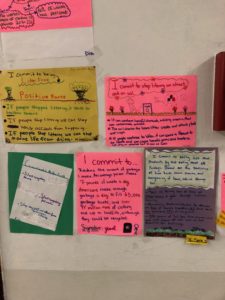
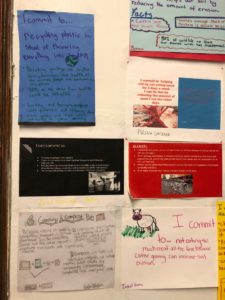
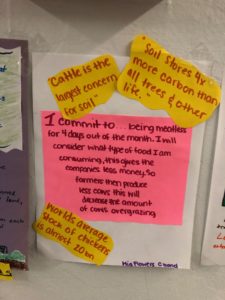
On the last day of class students were asked to think about if others at ESA were concerned about clean soil. Working in groups of 2-3 students they were to come up with 4 questions to interview ESA students and staff about livestock agriculture and/or garbage creation. They spent about 10-15 minutes coming up with their questions, then they went out into the hallways and conducted their interviews. They were tasked with interviewing at least 5 people. Afterwards, they came back to class and for the last 10 minutes we had a discussion about how the interviews went, the types of questions and responses.
Even though we only spent a week on this authenticity work, I think that it was an important discussion to have. Even if students didn’t stick to their commitments, it gave them some agency over their own lives. We discussed how we live in a capitalistic world and how it is not completely our (the consumers) responsibility to help the environment, but that even as one person, we can do our part. It got my students thinking and talking about the environment, and asking their peers and teachers their thoughts and opinions.
I think that this week long series of lessons helped to increase authenticity in my classroom. It was really great to have an open dialogue with students about the realities of how humans have negatively impacted soil and asking them to take a look and reflect on their choices. The challenges I faced were mostly about how this is not their fault, and the topic in itself can feel very overwhelming. For examlple, something I hear often from students (and adults) is “I’m only one person, what can I actually do that will make a difference.”
Cristie did a similar week with her class, but instead of having them make their commitment public, they had a discussion about Easy, Medium, and Hard things they could do to help soil (the environment). I really liked this idea because most of my students made commitment to stop littering, and I would have liked to push them more and have a discussion about some other things within their reach they could do.
I recently went to a PD where the teacher suggested that the class pick a cause, research it, and join it. It would be great to pick a local cause around soil health (environment) and do some real work around it.
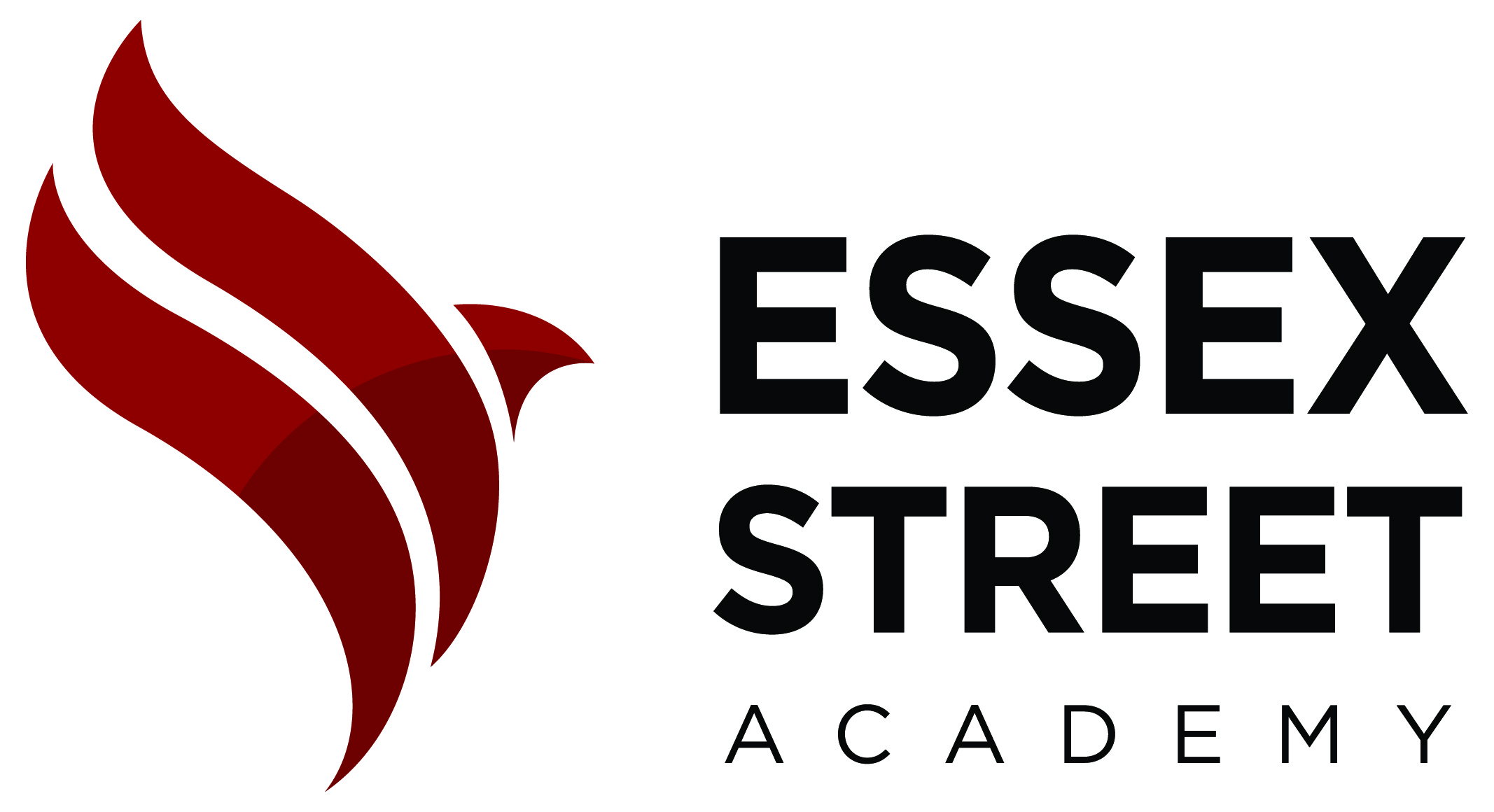
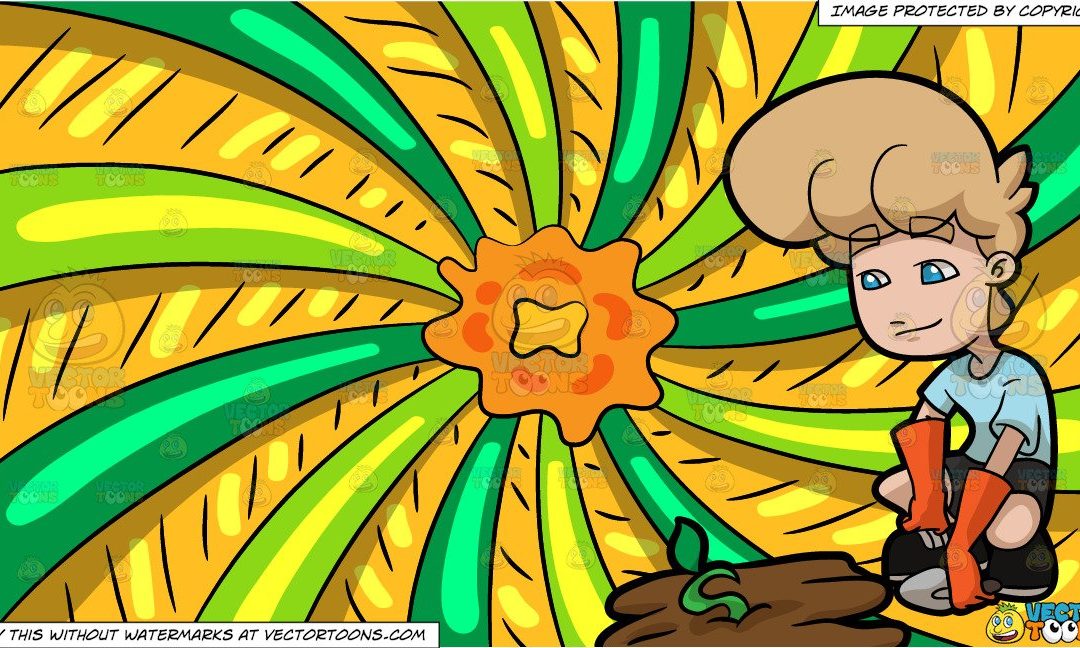
Neha, I love this for so many reasons. The biggest reason is how the unit required the students to engage in the curriculum using so many activities. You were having them perform research, conduct interviews, writing journals, collecting data, reading articles and so much more. It’s really hard finding ways to make content relevant to kids, but you managed to make something like soil fascinate and excite them! I’m wondering how students can take this a step further? I like the idea of having students pick a local cause around soil health, but I’m also wondering if we could use the roof in some way. A teacher that used to teach at ESA years ago, used to have a gardening class and took the kids to the roof for the ‘dirty’ work. I wonder if something like that could happen?